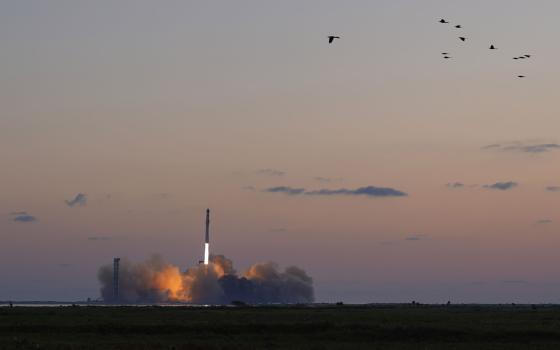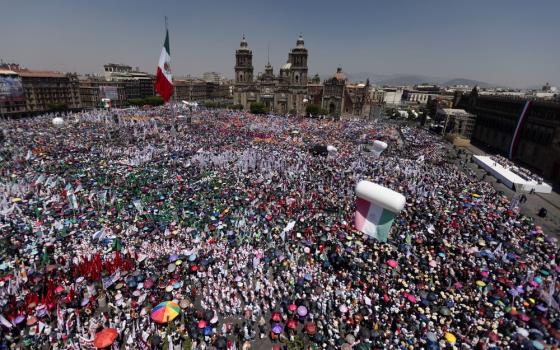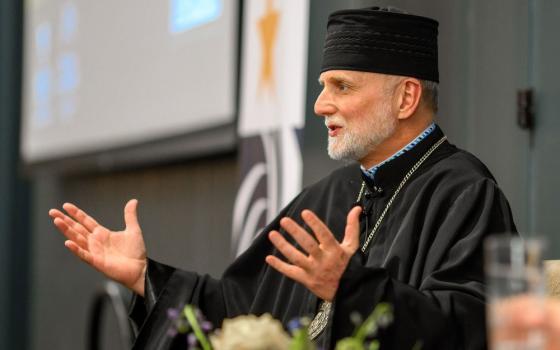
Maryland Catholics for Marriage Equality vigil outside Baltimore's Basilica of the National Shrine of the Assumption of the Blessed Virgin Mary ©Bill Hughes
Ryan Sattler, 68, thinks about his sister Mary every day. The youngest of four siblings, Mary was "the darling" of their close-knit Catholic family. She was barely a teenager when she told Ryan's wife, Joan, and later Ryan himself, that she was gay. It was difficult for Mary's parents to accept at first, but Ryan says their "fierce love" for her helped them overcome their initial shock and disappointment.
Ryan worried about his sister, who never seemed entirely happy. He overheard her lying about nonexistent boyfriends, even while living with her partner.
"She was afraid people wouldn't accept her as she was. She couldn't be herself," he said.
When her long-term relationship ended, Mary felt she had nothing -- not the heterosexual life she'd been lying about and not the life she was building with her partner. She began drinking heavily and taking pills, and shut out her family's repeated offers to help. Five years ago, she took her own life.
There are many reasons why Ryan supports Maryland's ballot referendum on marriage equality. But first and foremost, there is Mary.
"Watching my sister live two lives and then losing her like that makes me want other people to have a life that is better than hers was," he said. "An open life, a life without shame, a life of love and fullness."
The Civil Marriage Protection Act of 2012 passed the Maryland General Assembly in February and was signed into law by Gov. Martin O'Malley on March 1, but opponents gathered enough signatures to force a referendum. Maryland voters will decide the fate of same-sex marriage Tuesday.
Ryan has spent the last several months speaking at events throughout the state, volunteering at phone banks, emphasizing the law's strong protections for churches and religious organizations, and urging fellow Catholics to vote for Question 6. His commitment to progressive causes is deeply rooted in his faith. He and Joan worked for racial integration in Milwaukee with their Catholic community, protested the Vietnam War alongside priests from Marquette University, and helped establish a local food pantry and an anti-racist organization in York, Pa., before their move to Maryland three years ago.
"Ryan is a good, faithful Catholic," said Fr. Joe Muth, his pastor at St. Matthew Catholic Church in Baltimore. "He and others have tried to encourage thoughtful discussion about same-sex marriage at our parish. People want to talk about their beliefs and seek truth with compassion -- it's not necessarily healthy to shut down those conversations."
Question 6 will not pass without significant support from Catholics, who represent approximately a quarter of Maryland voters. Ryan said he believes the support is there; he cites a recent Pew Research poll in which 58 percent of Catholics said same-sex marriage should be legal.
"Catholics know that we have a duty to seek justice for everyone, that it is wrong to treat anyone as a second-class citizen because of their sexual orientation," he said. "When we, as Catholics, go into the voting booth, having formed our consciences through prayer and study and openness to the Spirit, many of us are going to vote for justice and equality."
Three hundred Baltimore Catholics signed a pledge, published in the Baltimore Sun on Friday, to vote for Question 6.
Ryan estimated that there are more than 1,000 Catholics statewide working to pass the referendum. According to Karin Quimby, deputy faith director of Marylanders for Marriage Equality, Ryan and other Catholic lay leaders have been "very effective" at the regional level.
"Catholics like Ryan are active in this campaign because of their faith," she said. "They have a deep need to speak out about justice and equality."
Ryan often wears a "Catholics for Marriage Equality" T-shirt or button and has given away dozens of each to Catholics who stop him to talk about Question 6. One woman he spoke with recently told him of her internal struggle.
"She said, 'I love my church, I respect the bishops, but my daughter is in a relationship with a wonderful woman. They want to adopt a child, start a family.' This is a highly personal issue for people -- many Catholic parents I talk to feel that the church has pushed their gay sons and daughters away," Ryan said.
He said he does not expect the church hierarchy to soften its position anytime soon. Archbishop William Lori of Baltimore has repeatedly urged his flock to vote against Question 6, so that -- as Lori explained in a Catholic Review column Sept. 20 -- "marriage as it has been known for centuries will remain as God intended." The archbishop of Newark, John Myers, recently stated that Catholics should not present themselves for Communion if they support same-sex marriage.
Ryan said many people have asked him why he is still Catholic, given the bishops' staunch opposition to same-sex marriage.
"The church has given me God's love, God's true presence," he said. "When I receive the Eucharist, I'm not thinking about the bishops. I receive the body and blood of Jesus, who loves me and welcomes all people to his table -- the same Jesus who is asking me to do what I can to feed the hungry, help the poor, love my neighbors. I know that I need a relationship with him and that I need to share his love with others. That's why I'm Catholic."
In a Baltimore Sun poll last month, 49 percent of respondents said they supported Question 6; 39 percent remained opposed. In another Sun poll last week, that 10-point lead had vanished. What will Ryan do if Question 6 is defeated?
"I'll be heartbroken if, when given the opportunity to love, we choose discrimination -- especially if a majority of Catholics do," he said. Regardless of the outcome, Ryan knows there will be a need for healing: "We'll have to continue working to break down the walls that divide people on this issue."
Ryan said he wishes his sister could have experienced the kind of lasting happiness he and his wife have known -- the same love he believes committed lesbian and gay couples share.
"I'll always wish that I could have helped Mary more," he said. "But I know that she will be with me when I vote."
[Nicole Callahan lives outside of Washington, D.C.]


